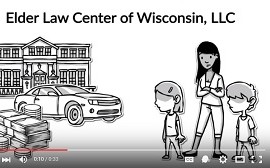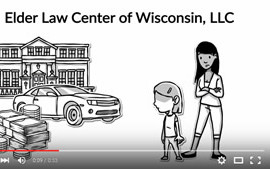FAQs Archives: "Estate/Financial Planning"
Are my assets safe in a Revocable Living Trust from Medicaid?
No. General rule of law holds that whatever you can access, others may access as well. Assets in a Revocable Living Trust are open and available to you; therefore, they are also open and available to Medicaid. What would make your assets safe is an Irrevocable Trust. The Irrevocable Trust allows you to protect your assets from Medicaid. For details on this and other Medicaid Planning Issues, contact us today.
Learn more about estate planning options available from the Elder Law Center of Wisconsin.
If one of us is already in a nursing home, is it too late to protect our assets?
No. It is never too late to protect your assets. The sooner you get started with Medicaid Planning the more you can protect. Contact us today to find out more.
Can I protect assets by transferring them to my kids?
No. Besides the obvious five year look back period, if your children get into financial trouble, the assets become available to their creditors. If your children go through divorce, the assets may become available to their spouses through divorce settlements. If your children have health problems, the assets may be at risk, as well. There may also be significant negative income, capital gain and gift tax consequences in gifting assets. In any case, by transferring your assets, you are losing control of them. For more information on asset protection options, contact us today.
I hold joint accounts with my kids. Are they safe?
No. Medicaid treats any asset with your name on it as yours unless you can overtly prove that the joint owner actually contributed assets to the account. To learn more about options for asset protection, contact us today.
Why do I need estate planning?
Simply put, effective estate planning is the best way to ensure that you will be able to control your property while you’re alive and well, provide for your loved ones and yourself if you become disabled, and leave your assets when you die to whom you want, when you want, and the way that you want.
Every state has laws that govern what becomes of your assets if you die or become disabled. But the government also allows you to establish your own set of rules that supercede those laws, if you so choose. The process of establishing your rules is called estate planning. So, for instance, while the state may require your will to go through probate, you can choose to spare your heirs this drawn-out and expensive legal process. But you can only do it through estate planning.
Why should I go to Elder Law Center of Wisconsin to establish a trust?
Not all trusts are created equal. Trusts are unique legal documents that provide for the protection and preservation of your assets, with specific attention to the requirements of Medicaid qualification. The trust will be drafted according to your specific goals. We have drafted thousands of trusts and specialize in this area. We can explain the different options you have in language that is understandable.
I can buy a Power of Attorney form at the office supply store/online for a couple of bucks. Why should I go to you?
The Power of Attorney form you buy at a stationery store is just the basic, standard form. It does not accommodate your wishes in any detail. When Elder Law Center of Wisconsin prepares a Power of Attorney document for you, it is custom tailored to your purposes, with specific instructions for your agent with respect to a broad range of planning issues, including:
> The creation of trusts
> Asset protection for your spouse before and after your death
> Asset protection for your children from creditors or divorce
> Prevention of business failure
> Information about finances and distributions
> Instructions on privacy
…and more. This is a detailed legal document of the type you cannot obtain off the shelf at the local store. It is VERY different from the standard Wisconsin Financial Power of Attorney which is ineffective for protecting assets.
What is a Will?
A will is a legal document that deals specifically with the distribution of your assets after your death. A will does go through probate.
What is a Trust?
Here is our explanation: A trust is like a limousine. Silly answer? Think about it…
Imagine for a moment that all of your assets are boxes – your home is a box, your car is a box, your bank account is a box, and so on. You have this stack of “boxes” you’re carrying in your hands as you walk through life. If you should trip and fall (i.e. die or become disabled), what happens to the “boxes”? They fall all over the place, and you need a lawyer to help you gather them all up. If you’re alive and disabled, the “boxes” are picked up by your Power of Attorney. If you’re dead, they can be picked up by your executor after your heirs go to probate court.
You can avoid all that with a trust. When you establish a trust, it’s like getting a limousine to put your “boxes” (or assets) in. They all fit inside the limousine, nice and snug. You have total control over what goes in the limousine, where it goes, etc. If something should happen to you, the only thing you drop is the steering wheel. The “boxes” (your assets) are all still safely tucked inside the limousine.
Now, in the glove box of the limousine is your book of instructions. These instructions spell out in very specific terms what you want to have happen if you can no longer control your limousine full of assets. That is what a trust is, your book of instructions that keeps your assets together, and establishes a plan for what happens to them if you should become incapacitated or after you die.


